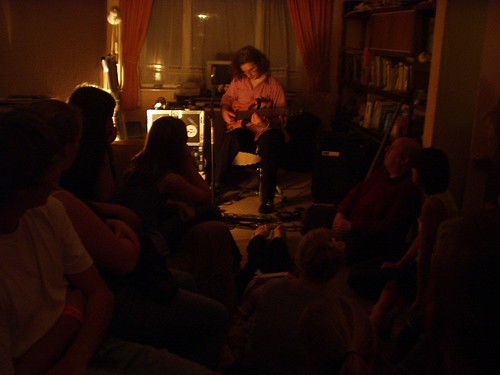 OK, let’s jump straight into part 2 with a few of the fears musicians have when making ourselves available to talk directly with our audience.
OK, let’s jump straight into part 2 with a few of the fears musicians have when making ourselves available to talk directly with our audience.
We’ll look at 3 areas we often get wrong when interacting with our audience, which are:
- How to treat your audience like friends rather than your ‘target market’. (notice I keep using the more neutral term ‘audience’ rather than ‘fans’ – I’ve never been all that comfortable with the word ‘fans’, seems a little patronising in some contexts, but substitute it if you wish…).
- allowing people to comment on what you do doesn’t mean you have to put up with insults and slander.
- don’t confuse inviting comment with asking for advice.
These three are biggies in terms of HOW we actually treat our audience.
- If You Treat Them Like Friends, They’ll Stick Around Longer. I was going through some old letters earlier today (we’re moving house) and found one from a guy I knew when I was a kid. It was the first letter I’d got from him in almost 2 years, and he was trying to sell me insurance! No introductory message, no catch-up, no context. Just ‘I’ve got a new job selling insurance; want some?’ It all came flooding back to me how used I felt when I got the letter, how insane it seemed, even back in those pre-spam days.The parallels with talking to your audience like friends are obvious. If all you ever say is ‘buy my shit!’, there’s no level of which it’s a friendship. Think about it in terms of ‘how would you feel if everyone you talk to on social media started behaving like you back at you?’ – if you’d be getting hundreds of adverts a day, it’s time to change your approach
- Allowing People To Comment On What You Do Doesn’t Mean You Have To Put Up With Insults And Slander – this is probably a bigger issue for Americans than Brits, given that you guys have a much stronger attachment to the notion of ‘freedom of speech’.I was chatting with Ben Walker last night over curry, about all the things that happened around the viral explosion of his Twitter Song video. One of the things that he got that seems to be endemic on Youtube was the hateful, nasty comments. Hundreds of them. From people who hadn’t even watched the video, but just spend their time posting hateful comments for absolutely no reason. Fortunately Ben found it funny. His girlfriend, less so. I never allow insulting comments to stay on any site that I moderate. Disagreement is fine, but politeness is a must.My rule is, if someone said it to me in a pub, would I walk out? I’ve stopped posting on a couple of bass-related forums because I was being insulted by a handful of posters. It’s not that I get upset by it, but it does become a waste of my time. I’m not one to court negativity or ‘controversy’ by getting into arguments with internet trolls. I’m happy to chat with people who don’t ‘get’ my music, but insult me and I leave the conversation – as the person in the conversation who has a reputation of sorts, you’ll never win. So the lesson is, keep such discussions to places you can moderate – Myspace, twitter, facebook fan-page, Ning pages, reverbnation comments, self-hosted forums : all of those are places you can keep the atmosphere at a level you’re socially comfortable with. Don’t feel like you owe airtime to people with a grievance. Deleting insulting posts isn’t censorship, it’s selection – censorship suggests you’re denying them a voice, when actually you’re just choosing not to allow them to hijack YOUR audience. Anyone can set up a blog posting about how much they dislike whoever, they just can’t do it in my forum. Simple as.
- Don’t Confuse Inviting Comment With Asking For Advice – a lot of musicians, in order to stimulate conversation, ask their audience for their opinion on their work, be it released work or ‘works in progress’. It’s a good way to start a discussion, but there is a fine line between inviting people to pick their favourites, and getting completely unqualified criticism of your work from people with no idea what you’re actually trying to do.
Crowd-sourcing advice for your music is a sure way of
a) confusing yourself, and
b) losing any sense of a coherent narrative to what you do.
I make it as plain as I can without sounding stuck-up that I don’t make music FOR anyone except me. Not because I don’t care what they think, but because I can’t. I can only soundtrack the world as I see it, as best I can. Someone else telling me what I could do differently to best suit their aesthetic, their view of the world is completely futile.That’s not to say that I don’t have people whose opinion I trust who can comment and critique what I do – I have a whole list of them – it just that each of them have earned that place over years of listening and conversation. It has context. It’s also certainly not to say that I don’t like hearing what people like and don’t like about what I do. It’s fascinating to hear, and hugely encouraging when people ‘get it’, on whatever level. But as an example, we recently had a letter back from a record label about the Lawson/Dodds/Wood album (have you bought it yet? 🙂 ) The guy said he really like it, but threw in ‘maybe it needs a female vocal?’ – why? Why would it ‘need’ anything? Why do we need telling that? because we don’t know any female vocalists? The last few gigs we’ve done as a trio have featured one of the finest female vocalists I’ve ever worked with, and if we felt like we needed to add her voice to the album, we’d have done it. I’ve no idea who this dude is, I’m glad he likes the record, but have no real interest in whether or not the album sounds like it needs samples of dogs barking or clowns being kicked squarely in the nuts on it, in his estimations. It’s not that his opinions aren’t valid to him, they just lack context in relation to how and why WE made OUR record.
Talk to your audience like friends
don’t patronise them
don’t shout at them
listen to them but don’t pretend they’re your producers
share things of value with them
invite them into your creative pathway
give away information and ideas that have currency
help them and they’ll help you.
I’ve said before on a number of occasions, my audience is almost always entirely made up of people I’d love to go out for a curry with after the gig and chat to for hours. Demographically, my favourite people in the world are the ones that go to Steve Lawson gigs. If I wasn’t Steve Lawson, I’d be hanging out at his gigs to meet cool people. Somewhere along the line the approach to drawing an audience into your world that I’ve outlined above has worked pretty much perfectly for me.
Take the principles and examples, think about them, discuss them, adapt them, play with them, jump in and try chatting to your fans. See what happens. Please post and thoughts, comments or questions below.
Part 3 I’ll look at some of the software and hardware tools that work best.

 There’s been a whole load of talk in the last few days, following on from the financial crash, saying that ‘
There’s been a whole load of talk in the last few days, following on from the financial crash, saying that ‘ So, following up my thoughts about the ‘
So, following up my thoughts about the ‘ I’ve just spent 3 days geeking out in Helsinki, at the
I’ve just spent 3 days geeking out in Helsinki, at the